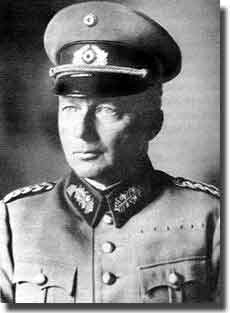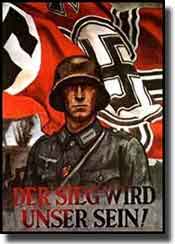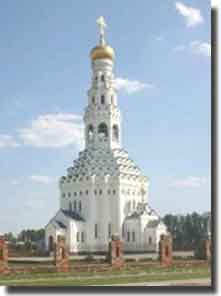|
Field Marshal Guenther Hans von Kluge. ( 1882 - 1944 )
Infantry Division and later the Alpine Corps. As a strong supporter of the then C in C of the Army, Werner von Fritch who was retired through trumped up charges of homosexuality, Kluge too was retired in February 1938. But with war clouds looming later in 1938, Hitler pulled Kluge out of retirement and gave him the command of Army Group 6 based on Hanover, which included 6 Divisions. Kluge was the typical Prussian professional soldier, he was not too enamoured with the Nazi regime, but saw the need to pay lip service to it, so he might enhance his military career. He really believed he should join up with the anti Hitler conspiracy, but just could not bring himself to do so, thus always vacillating between duty and personal gain. Invasion of Poland. Promoted to Colonel General. Now made a Field Marshal.
Invasion of Russia. By August 1941 Kluge was again in command of infantry corps. The Russians counterattacked on the 6th. of December, by the 18th. Field Marshal Bock had been relieved of command and Kluge put in his place. Now Kluge was trying to hold every inch of held territory, and Guderian retired to save his troops whether German HQ agreed or not, and on Christmas Day, Guederian was relieved by Hitler with Germany losing one of her most able tank commanders, with von Kluge having the last laugh over one of his detractors. Kluge would always obey Hitler's orders quite blindly, that is what enamoured him to his boss, and as a result heads rolled, General Ludwig Kuebler, Commander 4th. Army, Hoepner, and Colonel General Adolf Strauss, Commander of the 9th. Army both replaced. The German invaders paid a tremendous cost that winter in Russia, the Wehrmacht lost 981,895 killed, representing 30.68% of the troops on the Eastern Front. In the offensive of 1942, because of those awful losses, Germany could but drive on one front. Kluge did play a significant part by feining a major threat to Moscow, Stalin took that bait and concentrated his forces against Kluge, but the real thrust came against Stalingrad and the Caucasus. Over 1942 Kluge was involved in some minor offensives, at Kirov he destroyed the Soviet Cavalry Corps Belov accounting for 20,000 troops, and then the Soviet 39th. Army and I1 Cavalry Corps at Bely. In August, Kluge was ordered to chop off the Russian salient at Sukhinichi using the 9th. and 11th. Panzer divisions, but he protested that any attack would fail as he had too few forces. Hitler told him to get on with it with what forces he had available. As indicated by Kluge, this attack did fail, and he received a reprimand from Hitler, then as if to placate his commander here, the Fuerher on the 30th. of October sent Kluge a cheque for 250,000 Reichmarks. A somewhat strange gesture by the Dictator.
Failure at Kursk. Later in 1943 as the Russians pushed the German line westwards, Kluge slowly retreated to the Panther line in Belorussia, then on the 28th. of October 1943, his car skidded on a patch of ice and ran off the road, Kluge was badly injured and needed eight months off before he could return to duty.
Playing both sides in 1944. Back in the Army. Kluge taking his lead from Hitler thought all he needed to do was to put some backbone into the commanders of Armies Group B and Group G. He had a terrible run in with Rommel telling him " Now you too, will have to get accustomed to obeying orders." Kluge told him he was too pessimistic and failed to follow Hitler's orders as wholeheartedly as he should. Rommel was incensed by all this criticizism, and told his boss he ought to visit the front before drawing any conclusions. He did so visit and within days became both sober and quieter. Rommel was critically wounded on the 17th. of July, and Kluge took over his Army Group B command as well as OB West. Hitler reported dead. It seemed the attempted coup had got under way, but its outcome was still not fully known, Kluge did not commit himself at this stage, he waned to know who would win, he later talked to Keitel to learn that Hitler was in perfect health. The French Military Governor, General Karl Heinrich von Stuelpnagel and his Chief of Staff, Luftwaffe Colonel Caesar von Hofacker appeared, exhorting Kluge to act, he denied all knowledge of the conspiracy to kill Hitler, and reported its failure. He invited them both to dinner, eating in silence by candlelight, a quite ghostly atmosphere. After the meal, Stuelpnagel indicated to the Field Marshal he had ordered all SS and Gestapo men in Paris to be arrested, Kluge was shocked at this admission, he was reminded that a year ago in Russia he had agreed to be part of the conspiracy, yes! he stammered, but that was conditional on Hitler being killed. Hofacker said : Herr Field Marshal the fate of millions of Germans and the honour of the Army lies in your hands." " No." cried out Kluge, and promptly relieved Stuelpnagel of his command, ordering him to release all the SS and Gestapo men in custody. Kluge now consolidaed his position with Hitler by sending a message calling the conspirators " ruthless murders." and assuring the Fuehrer of his own " unchangeable loyalty." But he was a little late, Hofacker was arrested and promptly implicted both Kluge and Rommel, the FM was virtually fighing for his life now. On the 24th. of July the Germans had seven panzer divisions and four heavy tank battalions facing the British 2nd. Army around the Caen area, but against Omar Bradley's US 1st. Army at St Lo, but two rather depleted panzer divisions held the line. The German 7th, Army had seven divisions in line, and three in reserve, they had battered the US forces causing 10,000 casualities, but had suffered large losses, its troops worn out, and the panzers of the 7th. were down to 109 tanks. But they faced a US force of fifteen divisions, General George Patton was there with four divisions in reserve. 25th. of July 1944. This once elite panzer division sustained over 70% casualities, as the US VII Corps tried to advance it was more impeded by the bomb craters than opposition from the few survivors. Kluge was too slow to react, he had promised to send Panzer Lehr Division an SS panzer battalion of 60 tanks, it arrived with just 5, the following day, a mere 19, worn out tanks were blasted by five American divisions, two of whom were armoured, it was the end for the last remnant of Panzer Lehr. On the 27th. of July the US VII Corps was gaining ground, and Kluge ordered the 2nd. and 116 Panzer Divisions to reinforce the threatened area, too late, LXXXIV Corps were overrun, and the line was broken. General Patton's 3rd. Army expanded the gap, pushing seven divisions down a single road, they went north into Brittany, south into the heart of France, and east into Army Group B's rear. For German troops an envelopment threatened, typical of our Field Marshal, he now sought a scapegoat, and found one, in General Dietrich von Choltitz, whose LXXXIV Corps was cut off, he was relieved of his command and Lieutenant General Otto Elfeld put in his place. Now Patton was told to attack eastwards deep into Army Group B's rear, Hitler suggested all Kluge needed to do was smash the US 1st. Army at Mortain and then take Avranches with eight panzer divisions. The FM realised the nonsense of these orders but was not man enough to stand up to Hitler, already five of his Panzer Divisions were heavily engaged with Montgomery's 21st. Army Group. This map indicates the position Kluge was in on the 6th. of August 1944. Mortain was retaken, but fifty German tanks were lost, and the German push stopped in its tracks. Hitler made but one comment " The attack failed because Kluge wanted it to fail." Patton's forces rushed onwards, penetrating 75 miles in only three days, the German 5th. Panzer,7th. Armies and Panzer Group Eberbach in danger of being surrounded, the last route for escape, between Faliase and Argentan. Kluge should have taken flight, but could not bring himself to ask to do so, he wanted to concentrate all his armour at Argentan, but was denied by Hitler, who ordered an attack at Avranches. The gap between both US and British Armies, a mere 18 miles. On the 15th. of August, Kluge went off to meet with Hausser and Eberbach in the Falaise Pocket, he was missing for 12 hours, when he did arrive, he claimed his radio truck was destroyed by fighter bombers, and that he had spent the time hiding in a ditch. But Hitler thought his FM might have been in contact with the Allies, trying to arrange a surrender. Hitler had had a gutful of Kluge, he sent for both Kesselring and Model to chose someone to take over Kluge's command. On the 17th. of August, Field Marshal Model arrived with a letter relieving Kluge of his command, the war was over for him. Model now directed the Battle of the Falaise Pocket, evacuating units as fast as he could, of the 100,000 in the breakout, some 40,000 were taken prisoner, and 10,000 were killed, so half escaped. Kluge started his journey back to Germany on the 19th. of August, he appeared to know his fate on arrival, his driver was ordered to stop at Metz, where he had fought some of his WW1 battles, he spread a blanket on the ground, taking his life with a cyanide capsule, it was all over. He left the following farewell letter to Hitler:
It is reported that Hitler read this letter and made no comment. He had Kluge quietly buried with Military pall bearers, but no Military honours. He was officially pronounced dead from a cerebral hemorrage. Conclusion. I guess one might sum up by saying Kluge was not an attractive character, who really believed that he always did his duty. return to index of "Adolf Hitler and his WW2 Field Marshals" |

 Guenther Hans von Kluge had been born in Prussia at Posen on the 30th. of October 1882. He was to join the Imperial Army as the new century arrived, having attended Cadet Schools. His commission came as a second Lieutenant with the 46th. Field Artillery at Wolfenbuettel on the 22nd. of March 1901. After promotion to Lieutenant a long time later, he took General Staff training at the War Academy. With WW1 breaking out in 1914, he was a Captain on the staff of XXI Corps, leading a battalion on the Western Front, then returning to staff duties for two years with the 89th.
Guenther Hans von Kluge had been born in Prussia at Posen on the 30th. of October 1882. He was to join the Imperial Army as the new century arrived, having attended Cadet Schools. His commission came as a second Lieutenant with the 46th. Field Artillery at Wolfenbuettel on the 22nd. of March 1901. After promotion to Lieutenant a long time later, he took General Staff training at the War Academy. With WW1 breaking out in 1914, he was a Captain on the staff of XXI Corps, leading a battalion on the Western Front, then returning to staff duties for two years with the 89th.

